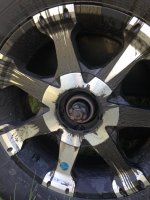Nac305rm
PR Member
Be vigilant with maintenance on wheel bearings. We arrived at the Society Hill GNCC this morning in South Carolina and found this
 on our trailer!
on our trailer!
Bearings were greased in the last 2 weeks! It could happen any time!
Wheel was held on only by the nut! We Spent our entire day finding an entire axle as the spindle had all of the bearings welded to it! Check, double check and double check it again! So thankful it did not happen on the highway!
 on our trailer!
on our trailer!Bearings were greased in the last 2 weeks! It could happen any time!
Wheel was held on only by the nut! We Spent our entire day finding an entire axle as the spindle had all of the bearings welded to it! Check, double check and double check it again! So thankful it did not happen on the highway!
